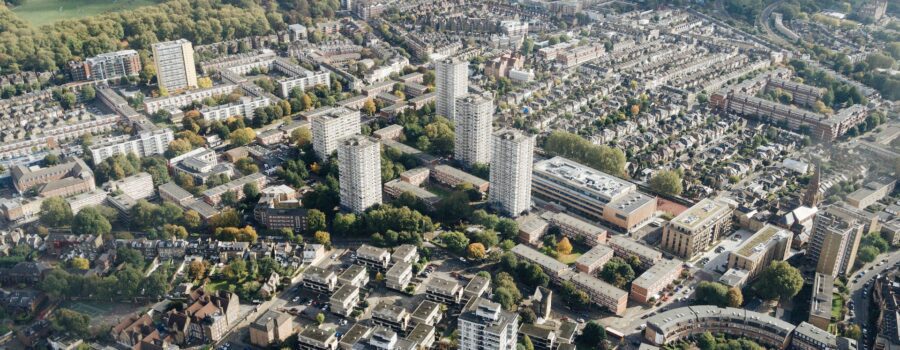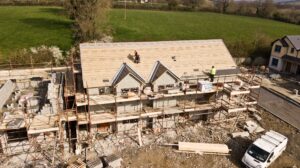
Unveiling the Secrets of Lucrative Property Development
Whether you’re interested in constructing a new building or performing renovations on an existing one, you can choose to do so as a property developer. In the real estate industry, property development is a process that involves a wide range of different construction projects. If the project involves building a residential home, property development could include everything from acquiring land and obtaining building permits to financing the project and constructing the building.
Being a property developer can be a lucrative career since developers are usually in high demand. While there are some challenges that property developers must contend with, the potential returns are substantial if you’re able to mitigate the risks. In this guide, you’ll discover the secrets of how property development can be a rewarding career path.

What is Property Development?
Property development involves building new structures and making modifications to existing ones in order to increase their value. Developers are tasked with handling every stage of the project, which extends from planning and design to financing and execution. Real estate development usually involves developing a piece of land into a residential or commercial building.
People who work as developers can create restaurants, large estate homes, retail spaces, hotels, and apartment complexes. After the property developer oversees the construction process, they usually sell it to an investor. However, there are times when a developer will sell directly to a home buyer. It’s commonplace for real estate developers to start out as real estate agents.
The Process of Property Development
There are three distinct phases in property development, which include pre-development, construction, and post-development. There are times when highly complex projects will have other stages based on location or the goals the landowner has.
Pre-development involves performing market analysis, selecting the construction site, and obtaining the right permits and approvals. During this stage, the developer will have extensive communication with various third parties, the primary of which will be the local building and safety department. Before construction begins, developers are required to budget soft and hard costs, perform feasibility studies, and request environmental reports.
The construction stage of property development occurs when the developer builds and implements the main parts of the project. After the developer has obtained all the necessary permits, they can start construction without fear of running into issues with the local building department. Development teams will need to work alongside their preferred construction company to make sure that each aspect of the construction process is tracked.
Before post-development occurs, developers receive a certificate of occupancy, which is given once the building complies with local building codes and regulations. To prevent delays before being approved for a certificate of occupancy, you should track the steps you took during the construction process.
Post-development is centered around completing the project, addressing any small issues that are identified, and preparing the property for lease or sale. At this stage, developers want to monetize the work they’ve done. There are multiple ways to make money after developing a property. While many developers sell to an investor or buyer, it’s also common for developers to hold onto the property themselves and make money by leasing it to other tenants.

Challenges in Property Development
Even though property development can be highly rewarding, there are many challenges that a developer must navigate for their projects to be successful. For instance, a misread of the local real estate market can cause the developer to invest in an area that’s about to experience an economic downturn. Developers need to consider everything from economic concerns to environmental issues to determine if a project will garner long-term success.
If the developer chooses the wrong site, the results of their project can be adversely impacted. If you work as a developer, the site you choose should align with your target market. It’s also possible for a construction project to receive neighborhood opposition. Even if the developer has the law on their side, there’s a chance that community opposition to their project can kill it for good. The many reasons that a community may oppose a construction project include conflicts of interest, conflicts of values, and fear of traffic and noise.
Developers must contend with the need to obtain the right approvals and permits. If you’re constructing a building in Los Angeles County, you’ll apply for permits with the Los Angeles Department of Building and Safety. Consider hiring a permit expediter to help you complete the application process with ease.
In certain situations, obtaining the right building permit is relatively hassle-free. On the other hand, the permit approval process can take months or even years depending on the complexity of the project and any issues that arise. Keep in mind that permits are necessary even when you’re altering an existing building. Developers are often tasked with applying for additional permits when installing or altering mechanical, plumbing, HVAC, and electrical systems.
If you work as a developer, you’ll also face job site risks. Even if you believe that a construction site is safe, all potential hazards should be identified and further evaluated. If you can’t remove these hazards altogether, there should be safety procedures and plans in place to mitigate the risks. Potential hazards include:
- Slipping and tripping
- Falling
- Excess noise
- Material exposure
- Falling objects
- Scaffold-related injuries
- Vibration-related injuries
- Burns
- Electrical accidents
- Material handling issues
Even though the contractors who are hired for the project are required to maintain worker safety, the developer has the most responsibility. There are some construction site hazards that can result in project delays as well as higher expenses. For instance, an adverse weather event may damage construction materials or shut down the worksite temporarily. Additional issues include unexpected utilities, large rocks that are difficult to move, high groundwater levels, poor soil, and buried debris.
Among the more costly challenges to navigate involves the potential for design defect losses. While architects usually have liability insurance that provides protection in the event of a design mistake, the losses in this situation can be far higher than what the policy covers. The developer will end up paying the difference.
There’s a potential for project costs to be far higher than they were originally estimated to be. Even though real estate development can be lucrative, profits quickly disappear when costs run too high. Budgets often exceed estimates based on varying material and labor costs as well as unexpected delays.
Mitigating Risks in Property Development
Every challenge mentioned above can be addressed with simple solutions. To make the most out of your next property development project, focus on mitigating risks early on. First, it’s highly recommended that you conduct thorough market research and analysis to better understand current market needs and avoid constructing a building that won’t make you money.
You should also take time to carefully research potential development sites based on such factors as environmental risks, accessibility, and nearby competition. You can effectively navigate opposition by performing extensive outreach and addressing the concerns that the community has.
Since the permitting process can take a considerable amount of time to be completed, you should begin the approval and permitting process early on. Make sure that you maintain good communication with the local building authorities. Before construction starts, implement safety plans and procedures on the construction site to boost worker protection.
You should also select reputable architects who shouldn’t make any mistakes when designing the structure. It’s possible to reduce the risk associated with design defects by increasing the insurance policy coverage or purchasing an Owner’s Protective Professional Indemnity (OPPI) insurance policy. Consider allocating buffers in your timeline and budget to account for possible cost overruns and delays. The buffer should be around 10-15% of the total project costs.

The Role of Real Estate Developers
Real estate developers are responsible for acquiring and developing properties, after which they add value to their holdings by performing renovations and constructing new buildings. Developers handle the entire project from the initial planning stages to the final execution of construction. As mentioned previously, it’s common for developers to sell their completed properties to investors for a significant profit.
Key Skills and Education for Real Estate Developers
If you’d like to become a real estate developer, you should know that having a formal education isn’t required. However, you should have a few years of construction or real estate experience to gain a better understanding of the real estate industry and how to effectively navigate it.
Because of the importance of site selection and market analysis, it’s highly recommended that you have strong research and analytical skills. Cultivating your networking skills is necessary if you want to be effective at acquiring land, marketing your property, and obtaining funding.
Conclusion
Property development can be a lucrative but challenging endeavor, which is why you must have the right mindset before delving into this career. Selecting the right site, understanding market dynamics, addressing community concerns, obtaining necessary approvals, ensuring safety, minimizing design defects, and managing costs are key to success. If you don’t spend time mitigating risks, at least one of these issues will occur. From the initial acquisition of land to the final sale, real estate developers play a vital role in the entire development process.

Jason Somers, President & Founder of Crest Real Estate
With over 15 years of professional experience in the Los Angeles luxury real estate market, Jason Somers has the background, judgement and track record to provide an unparalleled level of real estate services. His widespread knowledge helps clients identify and acquire income producing properties and value-ad development opportunities.
Learn more about Jason Somers or contact us.



